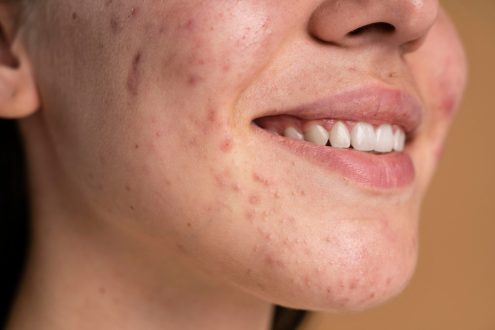- Empty cart.
- Continue Shopping
Does Diet Really Cause Acne?
Does Diet Really Cause Acne?
For years, people have debated whether diet plays a role in acne. Some believe that certain foods trigger breakouts, while others argue that acne is primarily caused by genetics, hormones, and skincare habits. But can what you eat really affect your skin? Let’s explore the connection between diet and acne to find out if your food choices might be influencing your skin health.
1. The Role of Hormones and Acne
- Truth: Hormones are a major factor in acne development. Hormonal fluctuations, particularly during puberty, menstruation, or stress, can cause the sebaceous glands to produce more oil, which can clog pores and lead to acne. While diet doesn’t directly cause these hormonal changes, it can influence hormone levels, which may, in turn, affect your skin.
2. How High-Glycemic Foods May Trigger Acne
- Truth: Foods with a high glycemic index (GI)—like white bread, sugary snacks, and processed carbohydrates—cause a rapid spike in blood sugar. This spike triggers a surge of insulin, which can increase the production of oils in the skin and contribute to clogged pores. Research has shown that diets rich in high-GI foods may be linked to an increased risk of acne breakouts.
3. Dairy and Acne: Is There a Link?
- Truth: Dairy products, particularly milk, have been a topic of debate when it comes to acne. Some studies suggest that milk, especially skim milk, may contribute to acne by increasing certain hormone levels, like insulin-like growth factor 1 (IGF-1). IGF-1 can stimulate oil production in the skin, which may worsen acne for some people. However, not everyone who consumes dairy experiences breakouts, so it depends on individual sensitivity.
4. Greasy Foods and Acne
- Myth: Eating greasy foods like pizza or french fries will cause acne.
- Truth: Greasy foods don’t directly cause acne, though many people believe they do. However, touching your face with greasy hands after eating can transfer oils and bacteria to the skin, which may contribute to breakouts. It’s not the consumption of greasy foods but rather how they interact with your skin through contact that may lead to acne.
5. Chocolate and Acne: Fact or Fiction?
- Truth: The idea that chocolate causes acne has been around for decades. While research is still ongoing, there’s no solid evidence linking chocolate consumption to acne. However, chocolate with a high sugar content may contribute to acne through the same mechanisms as other sugary foods. Dark chocolate with low sugar levels is less likely to cause breakouts compared to milk chocolate or candy bars with added sugars.
6. Omega-3 Fatty Acids and Skin Health
- Truth: Omega-3 fatty acids, found in foods like fish, walnuts, and flaxseeds, may help reduce inflammation in the body, including inflammation that can lead to acne. Studies suggest that diets rich in omega-3s may help decrease the severity of acne by balancing oil production and calming inflamed skin.
7. Gut Health and Acne
- Truth: There’s growing evidence that gut health plays a role in skin health. An imbalance in gut bacteria, known as dysbiosis, may lead to inflammation in the body, which can manifest as acne. Eating a diet rich in probiotics (found in yogurt, kefir, and fermented foods) and prebiotics (found in fiber-rich fruits, vegetables, and whole grains) may support a healthy gut and improve skin health.
8. Hydration and Skin Health
- Myth: Drinking more water will prevent acne.
- Truth: While staying hydrated is essential for overall skin health, drinking water alone won’t prevent acne. Water helps flush toxins from the body and supports skin hydration, but acne is primarily influenced by factors like hormones, oil production, and clogged pores. However, proper hydration can keep your skin looking fresh and balanced, which may indirectly support your skin’s healing process.
9. What Should You Eat to Improve Your Skin?
If you suspect that your diet may be affecting your acne, here are some dietary tips that might help:
- Low-Glycemic Foods: Focus on whole grains, fruits, vegetables, and legumes, which have a low glycemic index and help keep your blood sugar stable.
- Healthy Fats: Include omega-3 fatty acids from sources like fatty fish (salmon, mackerel), walnuts, and flaxseeds to reduce inflammation.
- Probiotic-Rich Foods: Support your gut health by eating probiotic-rich foods like yogurt, sauerkraut, and kimchi.
- Limit Sugary and Processed Foods: Reduce your intake of sugary snacks, processed foods, and high-GI foods to avoid insulin spikes that can worsen acne.
- Monitor Dairy Intake: If you notice that dairy products seem to trigger your acne, try cutting back on milk and cheese for a few weeks to see if your skin improves.
Conclusion: Does Diet Really Cause Acne?
In conclusion, while diet alone doesn’t directly cause acne, certain foods can influence factors that contribute to breakouts, like oil production, inflammation, and hormone levels. A balanced diet rich in whole foods, healthy fats, and probiotics may help reduce acne and improve overall skin health. However, acne is complex, and it’s important to address other causes like skincare habits, genetics, and hormones. If you’re concerned about your acne and think your diet might play a role, consider keeping a food diary to track potential triggers and consult with a dermatologist for personalized advice.

